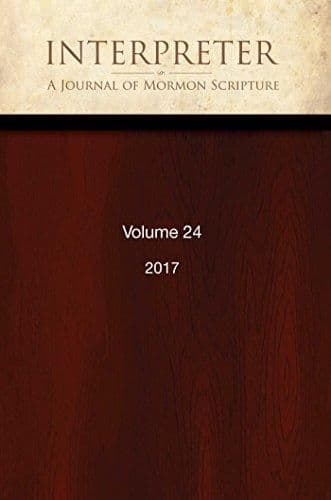Journal
"Most Desirable Above All Things": Onomastic Play on Mary and Mormon in the Book of Mormon

Title
"Most Desirable Above All Things": Onomastic Play on Mary and Mormon in the Book of Mormon
Publication Type
Journal Article
Year of Publication
2014
Authors
Bowen, Matthew L. (Primary)
Journal
Interpreter: A Journal of Latter-day Saint Faith and Scholarship
Pagination
27-61
Volume
13
Abstract
The names Mary and Mormon most plausibly derive from the Egyptian word mr(i), “love, desire, [or] wish.” Mary denotes “beloved [i.e., of deity]” and is thus conceptually connected with divine love, while Mormon evidently denotes “desire/love is enduring.” The text of the Book of Mormon manifests authorial awareness of the meanings of both names, playing on them in multiple instances. Upon seeing Mary (“the mother of God,” 1 Nephi 11:18, critical text) bearing the infant Messiah in her arms in vision, Nephi, who already knew that God “loveth his children,” came to understand that the meaning of the fruit-bearing tree of life “is the love of God, which sheddeth itself abroad in the hearts of the children of men; wherefore it is the most desirable above all things” (1 Nephi 11:17-25). Later, Alma the Elder and his people entered into a covenant and formed a church based on “love” and “good desires” (Mosiah 18:21, 28), a covenant directly tied to the waters of Mormon: Behold here are the waters of Mormon … and now, as ye are desirous to come into the fold of God … if this be the desire of your hearts, what have you against being baptized …?”; “they clapped their hands for joy and exclaimed: This is the desire of our hearts” (Mosiah 18:8-11). Alma the Younger later recalled the “song of redeeming love” that his father and others had sung at the waters of Mormon (Alma 5:3-9, 26; see Mosiah 18:30). Our editor, Mormon, who was himself named after the land of Mormon and its waters (3 Nephi 5:12), repeatedly spoke of charity as “everlasting love” or the “pure love of Christ [that] endureth forever” (Moroni 7:47-48; 8:16-17; 26). All of this has implications for Latter-day Saints or “Mormons” who, as children of the covenant, must endure to the end in Christlike “love” as Mormon and Moroni did, particularly in days of diminishing faith, faithfulness, and love (see, e.g., Mormon 3:12; contrast Moroni 9:5).
Subject Keywords
Bibliographic Citation
Terms of use
Items in the BMC Archive are made publicly available for non-commercial, private use. Inclusion within the BMC Archive does not imply endorsement. Items do not represent the official views of The Church of Jesus Christ of Latter-day Saints or of Book of Mormon Central.